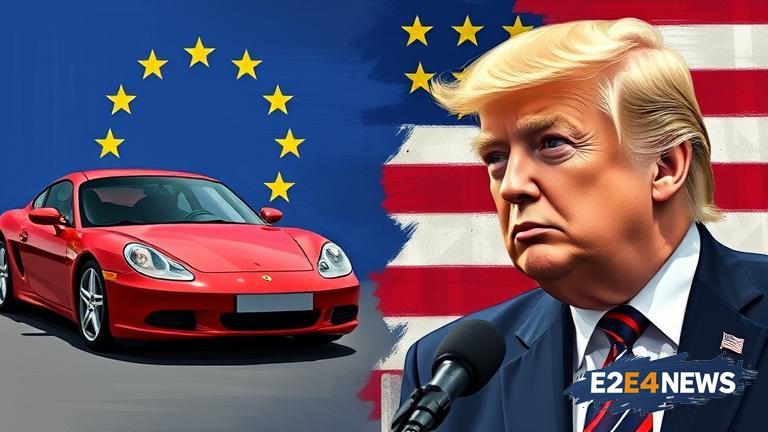The United States and the European Union are on the brink of a trade war as President Donald Trump has threatened to impose a 35% tariff on European cars if the EU fails to fulfill its investment pledge. The warning comes after the EU pledged to increase its investment in the US, but the American President is skeptical about the commitment. The EU has been trying to appease the US by offering concessions, including a potential reduction in tariffs on American cars. However, Trump remains unconvinced, and the threat of a tariff hike has sent shockwaves across the European automotive industry. The potential tariff would have far-reaching consequences, affecting not only the EU but also other countries that export cars to the US. The move is seen as a negotiating tactic by Trump to extract more concessions from the EU. The European Commission has expressed concerns over the threat, stating that it would lead to a significant increase in prices for American consumers. The EU has also warned that it would retaliate with its own tariffs on American goods if the US goes ahead with the plan. The trade tensions between the US and EU have been escalating over the past year, with both sides imposing tariffs on each other’s goods. The dispute has sparked concerns over the future of global trade and the potential consequences for the world economy. The US has been pushing the EU to reduce its trade surplus with the US, while the EU has been resisting American pressure to increase its imports. The situation has become increasingly complex, with other countries such as China and Japan watching the developments closely. The EU has been trying to diversify its trade relationships, signing new agreements with countries such as Japan and Canada. However, the US remains one of the EU’s largest trading partners, and the trade tensions have significant implications for European businesses. The European automotive industry is particularly vulnerable to the potential tariff, with companies such as Volkswagen, BMW, and Mercedes-Benz relying heavily on exports to the US. The industry has warned that the tariff would lead to significant job losses and economic disruption. The EU has been urging the US to reconsider its threat, citing the potential consequences for the global economy. The situation remains uncertain, with both sides engaged in intense negotiations to resolve the dispute. The outcome of the negotiations will have significant implications for the future of global trade and the relationships between the US, EU, and other major economies. The trade tensions have also sparked concerns over the potential for a wider trade war, with other countries such as China and Japan watching the developments closely. The US and EU have a long history of trade cooperation, but the current tensions have raised questions over the future of their relationship. The EU has been pushing for a more multilateral approach to trade, while the US has been pursuing a more protectionist agenda. The situation remains fluid, with both sides engaged in intense negotiations to resolve the dispute and avoid a potentially devastating trade war.
